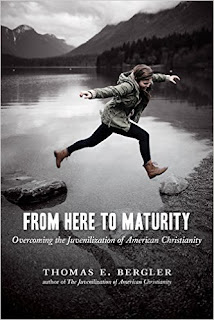In the ninth spot for the best books that I read in 2016 is
a follow-up book to Thomas Bergler’s TheJuvenilization of American Christianity.
This book, From Here to Maturity--Overcoming the Juvenilization of American Christianity, was written in 2014 after the initial volume was written in
2012 dealing with the immaturity of American churches. Bergler noted that he wrote the second book
as a response to the heavy load of correspondence that he received from his
readers. They understood what he was
stating but they wanted to know what the remedy was to move Christians toward a
higher level of spiritual maturity.
Chapter 1 is sort of rehash of the first book so that if you have not
read the first one, Bergler does his best to give you the first book in a
capsule form in 25 pages. While this
book is not written to apostolic Pentecostals, I do very strongly feel that
there are some components that need to be taken with the seriousness of which
Bergler writes. One thing that struck me
was that spiritual adolescents are drawn to religious experiences that produce
emotional highs and sometimes assume that experiencing strong feelings is the
same thing as spiritual authenticity. While
emotion is a part of Pentecostal worship, we dare not reduce it simply to
that! We are called to self-denial and
to bearing crosses in this life!
Bergler launches his premise of spiritual maturity in
Chapter 2 under the chapter heading of “Growing Up Into Christ.” One of the ways that he does this is point to
the pattern of Ephesians 4:11-16 where Paul is writing about the five-fold
ministry. He comes away with some points
in this passage:
·
Spiritual maturity is central, not incidental,
to God’s plan.
·
The roles of church leaders are to help them to
grow into maturity in Christ.
·
Maturity includes the unity of all believers,
knowledge of, and being like Jesus Christ.
·
Paul insists that we are not to be like children
who are easily swayed by false doctrine and other deceptions.
·
It must happen in a community of believers which
strongly promotes church attendance.
Bergler also does a fine job in this chapter where he makes
the connection between maturity and holiness.
When you see critics of holiness and separation from the world venting
on all platforms of social media, it becomes very clear that you are dealing
with very immature Christians at best or plainly unconverted sinners who had
some emotional experience that was mistaken for true conversion. Maturity matters! Holiness matters! There is a fine chart on page 49 that Bergler
uses to demonstrate that very visible result of someone who is given to
spiritual maturity by the visible,
outward display of conduct that evidences the work of the Holy Spirit
toward distinct holiness patterns of lifestyle changes.
Perhaps the most important chapter of the book is Chapter 4,
Reaching the Tipping Point. This chapter
demonstrates very practical ways that youth ministry and adult ministry can
work in tandem to change the culture of a church that is spiritually
immature. It requires mentoring relationships
and a shift in thinking. The change in
thinking moves from what can God and this church do for me to what can I do for
God and this church.
This book was a worthy investment that made me ask questions
as to how we could become both more spiritual and more mature at the same
time. I again found myself at a place of
understanding that for the church to really experience growth and maturity, it
will be boiled down to my daily relationship with the Lord by interacting with
Him in prayer and the Word. We cannot
improve on that matter but we can improve on our involvement with these crucial
spiritual disciplines.
Thanks for reading. . .





No comments:
Post a Comment